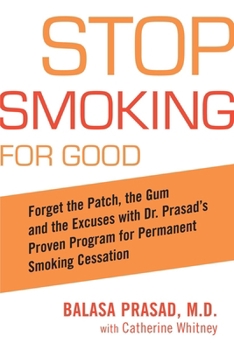Stop Smoking for Good: Forget the Patch, the Gum, and the Excuses with Dr. Prasad's Proven Program for Permanent Smoking Cessation
Select Format
Select Condition 
Book Overview
Why do most people who try to quit smoking fail-even with the help of the nicotine patch, gum, medications, hypnotism, or other state-of-the-art aids? In his radical approach to conquering the smoking... This description may be from another edition of this product.
Format:Paperback
Language:English
ISBN:1583332340
ISBN13:9781583332344
Release Date:October 2005
Publisher:Penguin Publishing Group
Length:160 Pages
Weight:0.35 lbs.
Dimensions:0.5" x 6.5" x 8.3"
Age Range:18 years and up
Grade Range:Grade 12 and higher
Customer Reviews
2 ratings
Great book for those of us who have tried and failed...
Published by Thriftbooks.com User , 14 years ago
I started smoking when I was 16 -- typical teenage rebellion thing, and wanted to fit in with the "cool" kids at work. I've smoked off and on for over 20 years. I've quit many times -- quite easily, the first few times -- and stayed away from the drug for months, even over a year. But I've smoked steadily for the past 10 years because my current "better half" as well as my previous one are both 1-pack+/day smokers. It's really, really hard to quit successfully when you live with someone who smokes... without resenting them, or eventually being turned off by them. I needed to find a way to quit without ending up with these negative feelings. I wanted to quit, and be happy about it. I found this book browsing through the meager selection at a brick & mortar store before my recent surgery -- I knew I would not be smoking for several weeks after my surgery because it's so bad for the healing process, so it seemed like a good opportunity to kick the habit forever. I leafed through several books on smoking cessation, most of which were lecture-oriented: smoking's bad for you, you're a social pariah, you're weak, blah, blah, blah. Yeah, we know it's bad. It doesn't help to know how bad, really. I needed something that would tackle the underlying addiction, and not in a way that would leave me yearning forever. Dr. Prasad's book caught my eye with his term "comfortable nonsmoker". I browsed through the first few pages in the store, and realized right away that he understood what makes smoking so incredibly compelling. It's immensely pleasurable. The warm, velvety smoke, as he describes it, lingers in your mind and lures you back in months, even years, after you've tried to break away from it. The key to quitting, the book says, is to understand what compelled you start to begin with, and to acknowledge the fact that you will have to forgo this pleasure for the rest of your life -- and be happy about it. It's also extremely critical that you have reasons to quit that are *internal* -- things you want to do for yourself. You can't quit successfully because someone else wants you to. It just won't last. One of my majors in college was psychology (with a focus on abnormal psych), so it made sense to me to read a book on addiction written by a psychiatrist. I was slightly uncomfortable at first with the categorizations that Prasad makes in his book -- identifying parts of the brain, for example, as the Intellectual Division, Emotional Division, and Instinctual Division. It smelled a little Freudian to me at first. But eventually I came to realize that he was using these categorizations to facilitate his communication, not necessarily to consider them absolute or definitive. In other words, in order for his book to progress, and for the pieces to come together in the end, he had to find ways of referring to more complex concepts by assigning names to them. It's been almost a week now since I've touched a cigarette. I've barely even begun my life as a co
good advice for all addiction
Published by Thriftbooks.com User , 18 years ago
I am halfway through the book, but I like his different approach. Emphasizes points that are relevant to addictions to all sorts. I found this helpful because I think my personality lends itself to substituting one addiction for another, this helps confront them all.





